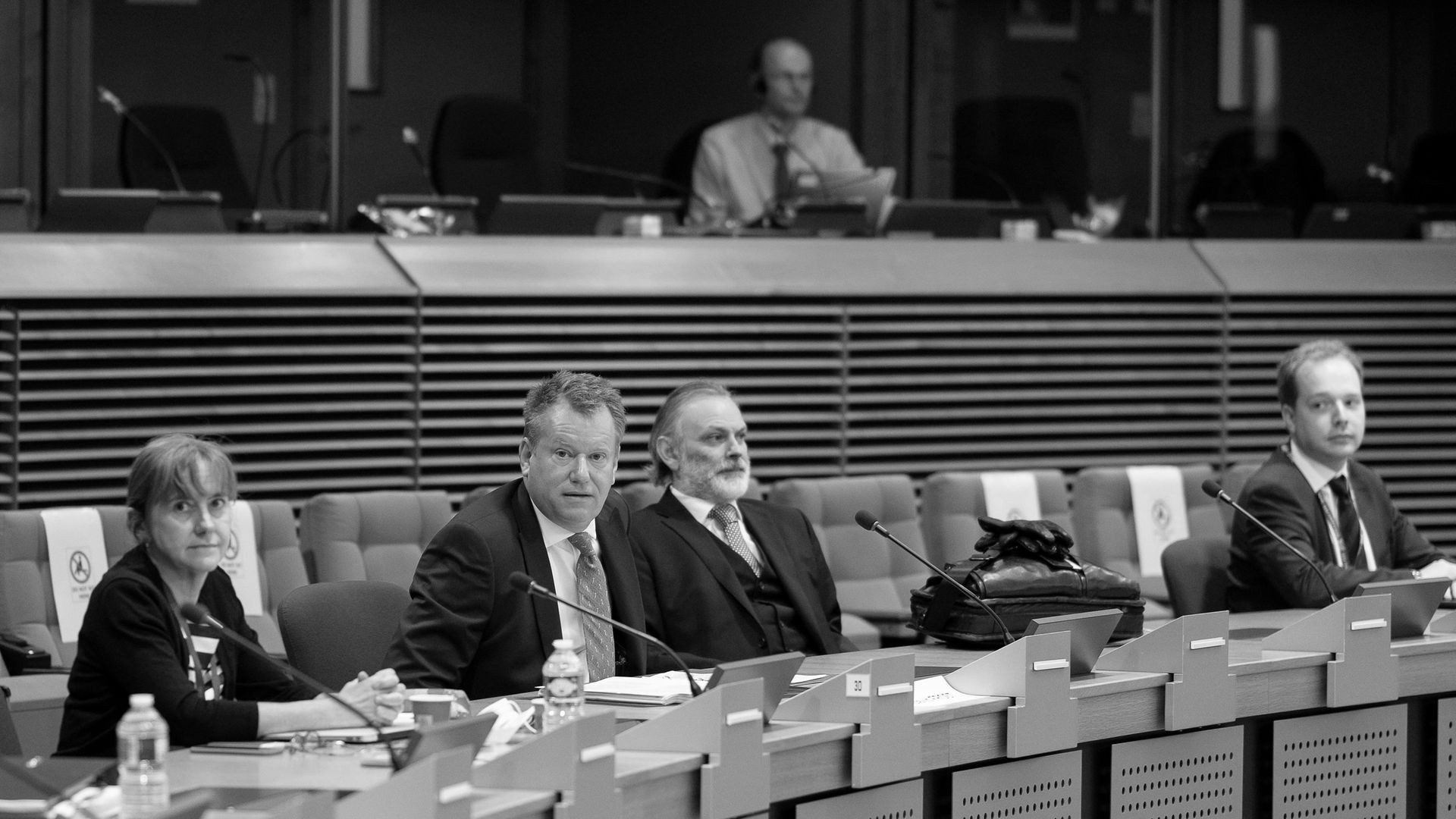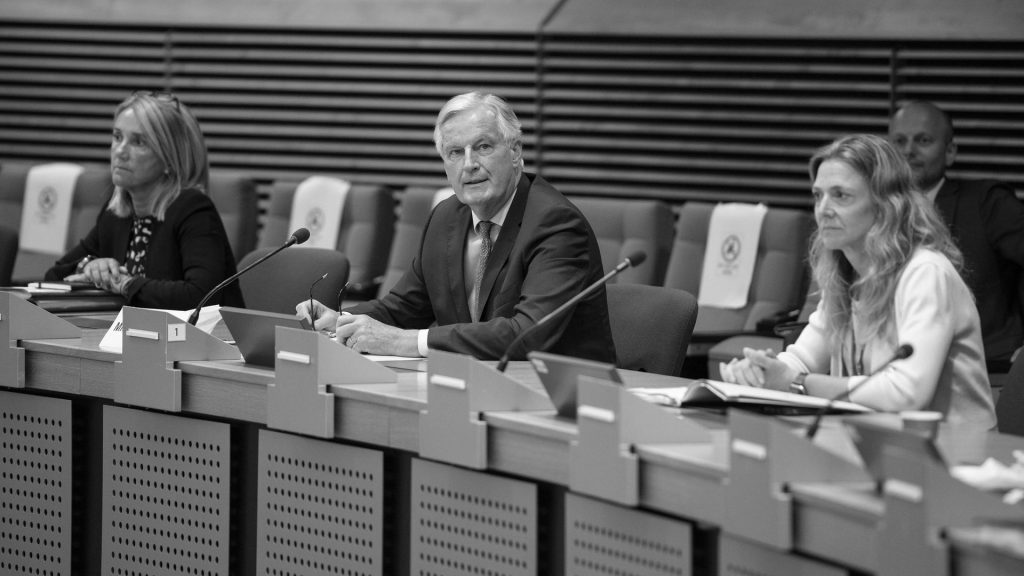
The latest phase of Brexit stumbles towards a predictably shambolic end. As with earlier episodes the familiar deluded posturing from the British government is part of the stumbling. After the EU summit, a deadline set by Boris Johnson for a trade deal, Number Ten proclaimed with the usual discordant swagger that the EU negotiators need not bother coming to London unless they make concessions. Two days later Johnson’s puny negotiator, David Frost, was on the phone to Michel Barnier.
Johnson’s post-summit tone was that of a ruler presiding over a superpower wholly equipped to flourish alone, ready to go ‘global’. The posturing gave no hint of lorry parks, economy wrecking tariffs and shortages. Johnson implied that it would be the EU’s loss if it did not “fundamentally” reconsider its approach to the mighty UK.
Dark patterns recur. In the same way that the UK was supposed to have a “world-beating” testing system for Covid the trade talks were supposed to have been part of an “oven-ready” deal. Instead once again the UK government overplays it hand, misjudging the approach of the EU with a comical ineptitude while acting with a loftiness at odds with the fragility of a country hurtling towards the cliff’s edge.
Consider what the Brexit tragedy looks like from the EU perspective, not a fashionable instruction. Obviously the EU negotiates out of self-interest and sometimes with an infuriating rigidity. Even so it has been a model of patient restraint in its dealing with the whacky series of UK governments since the referendum.
In December 2017 EU leaders dropped all plans and rushed to a special EU summit in order to sign the Withdrawal Agreement (WA) negotiated by Theresa May. They had made a significant concession, allowing the UK to remain in the customs union until “technology’’ was discovered magically as an alternative to a physical border in Ireland. They need not have bothered. This agreement was never passed by the UK parliament.
What followed was much worse. Johnson signed up to a different WA, broadly the one that the EU wanted in the first place. EU members were relaxed about Johnson claiming this to be a triumph. Their voters had lost interest in Brexit long ago. Johnson needed the worship of a willingly gullible British media and enough voters to win an election. The EU let him claim a victory over them. He won that election on a single slogan that was not true, that he had an “oven-ready deal” arising from his unyielding negotiating techniques compared with the weak-kneed Theresa May, even though it was May that had secured a less calamitous agreement.
Then last month Johnson declared with a swagger he was willing to break international law because of the flaws in his triumphant oven-ready deal. Now Michael Gove affects outrage that the EU want a legal agreement on issues such as a level playing field. Gove insists that the government is committed to issues such as workers’ rights so why does the EU demand a formal deal? The answer is that with good cause the British government is not trusted.
The lack of humility in the few that wield power in the UK government is striking. The shallow revolutionaries in Number Ten believe their own propaganda. Long ago they bought into a fantasy about British exceptionalism, the driving force of Brexit.
As a pupil Johnson received a distorting Etonian view of history in which the British always play a heroic role. The rest of his entourage, whether through history as taught at elite public schools or through other means, have convinced themselves that the UK would prosper uniquely if only it could be unshackled from the EU. The fact that in all key policy areas there was no entrapment from Brussels does not bother them.
When New Labour wanted to invest in some sectors it was allowed to do so. When the 2010 coalition sought real terms spending cuts and a fracturing of the public services, it had the freedom to make its moves. When Tony Blair wanted to back president Bush over the war in Iraq he did so. There are endless example but nothing must disturb the revolutionaries’ fantasies.
After the UK government’s world-beating failures in response to Covid accompanied by the biggest economic hit in the western world perhaps the revolutionaries might have reflected even fleetingly on the wisdom of their approach. The opposite is the case. Cocooned in Number Ten and the Cabinet Office they grow in confidence. They won the Brexit referendum. They can conquer again. They are still campaigning.
This is so deranged and counterproductive, but above all an act of cruelty to their country which they view with such romanticised pride. Farmers are in despair now about the prospects of a flimsy deal or no-deal. They have been anxious for a long time as ‘no-deal’ or a poor deal became a Brexit motif. Those dependent on the car sector and others working in the manufacturing sector are fearful and have been for years.

Others worry about food shortages or big price rises. Lorry drivers dread the jams and the bureaucracy. More or less the only place where there is aggressive self confidence is Number Ten, where the mindset is not about how best to govern but how to take on ‘elites’. Securing an effective test and trace procedure, let alone a world-beating one, is dull for them compared with bashing the civil service, the BBC or the EU.
The situation is so precarious and the act of self flagellation is so great historians will still be debating about how it happened in a hundred years time. The narrow answer is clear. Once Johnson decided to surround himself with zealots from the Vote Leave campaign and grant Dominic Cummings more power than any other special adviser in prime ministerial history the route was always going to be this one. Business leaders might plead for a sane approach. Senior civil servants on the Treasury might fear for the consequences of the economy. Johnson will be vaguely aware of the dangers of his hard Brexit but in Number 10 they are excited. This has been their project. They are winners. Liberated Britain will be a winner.
Johnson regards Cummings as a genius. Cummings and Gove instruct the under-qualified and naive negotiator, Lord (David) Frost. The UK has made no progress in the talks and in Number Ten they see this as a form of triumph. Frost will merit a footnote in the history books, a Dickensian character thrilled to be there, rewarded with a knighthood, a Union Jack in his lapel, he follows the macho instructions from Number Ten, hits a brick wall, picks himself up and hits another one. He too is convinced his hopeless endeavours have been a triumph for global Britain.
After decades of false assertions about the UK’s place in the world Brexit fantasists are close now to facing the realities. Above all, any other non-EU trade deal involves compromises and a mutual policing of the arrangements. A US trade deal with Trump would involve huge concessions from a desperate UK government and intense policing on both sides. If Joe Biden wins the presidential election there will be no US/UK deal for years.
There has been no regime like this before in the UK. All prime ministers are unique, but there has been no leader like Johnson. In comparison his predecessors seem to have much in common. Here is the latest example. According to the president of the National Farmers’ Union, Minette Batters, Johnson told her in a meeting last week that he would “rather die” than hurt UK farmers. He has already hurt them. They have been in anguish for years contemplating tariffs that would destroy their sector. Previous prime ministers could at least recognise the immediate consequences of a policy position. Johnson cannot do so, opting instead for the mendacious contraction. He would rather die than hurt farmers while his policies torment them.
Perhaps parts of the UK and its current elite rulers need to go through this, the pain of a flimsy deal or no-deal. Arguable only amidst destructive chaos can a cathartic appraisal take place of this country’s place in the world. This is not 1945 and anyway the UK then was wholly dependent on international co-operation.
Those slogans about ‘taking back control’ and the ‘left behind’ are powerful and relevant ones but have nothing to do with the UK’s former membership of the EU. An MP tells me that her voters cling to Brexit as they support a football team. They chose ‘freedom’ and are sticking with it, looking to Johnson to deliver.
In reality he delivers more chaos on top of Covid. At some point there will be a reckoning. But what a price to pay for a more reasoned debate about Europe and the UK’s modest place in the world after decades of overblown hysteria.
Steve Richards’ latest book is The Prime Ministers: Reflections on Leadership from Wilson to Johnson










